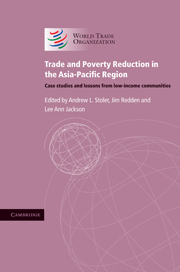 Trade and Poverty Reduction in the Asia-Pacific Region
Trade and Poverty Reduction in the Asia-Pacific Region Book contents
- Frontmatter
- CONTENTS
- CONTRIBUTORS
- ACKNOWLEDGEMENTS
- ABBREVIATIONS
- Introduction
- The economic effects of trade on poverty reduction: perspectives from the economic literature
- I Transnational corporations, trade and poverty reduction
- II Trade in agriculture and poverty reduction
- III Trade in services and poverty reduction
- IV Migration, labour mobility and poverty reduction
- V Trade and poverty reduction in small and vulnerable economies
- INDEX
- References
Introduction
Published online by Cambridge University Press: 05 March 2012
- Frontmatter
- CONTENTS
- CONTRIBUTORS
- ACKNOWLEDGEMENTS
- ABBREVIATIONS
- Introduction
- The economic effects of trade on poverty reduction: perspectives from the economic literature
- I Transnational corporations, trade and poverty reduction
- II Trade in agriculture and poverty reduction
- III Trade in services and poverty reduction
- IV Migration, labour mobility and poverty reduction
- V Trade and poverty reduction in small and vulnerable economies
- INDEX
- References
Summary
Why this book?
International trade is one of the greatest sources of modern wealth. However, it can be challenging and disruptive, especially to poor people who usually have very few resources and little capacity to cope with changes in the price of what they produce and consume. To share in higher global living standards, the poor must gain access to the benefits that international trade has to offer. But how?
There is a rich vein of academic analysis that deals with this question, much of it from a theoretical perspective. We wanted to contribute to an understanding of the ways in which governments and communities have dealt with trade as a practical challenge, especially in the Asia-Pacific region where approximately two thirds of the world's poor live.
Two years ago, we launched a project that has been jointly supported by the Australian Government’s official aid agency, AusAID, and the World Trade Organisation (WTO) to investigate this complex trade-poverty relationship through a series of research papers and case studies. We decided to look beyond ideological debates about free or fair trade, to see what is happening on the ground in low-income communities across a range of Asia-Pacific countries. The accounts collected in this book provide the reader with a rich experience of the successes, the failures and the challenges of trade policy and its ability to contribute to sustainable development.
- Type
- Chapter
- Information
- Trade and Poverty Reduction in the Asia-Pacific RegionCase Studies and Lessons from Low-income Communities, pp. 1 - 20Publisher: Cambridge University PressPrint publication year: 2009


